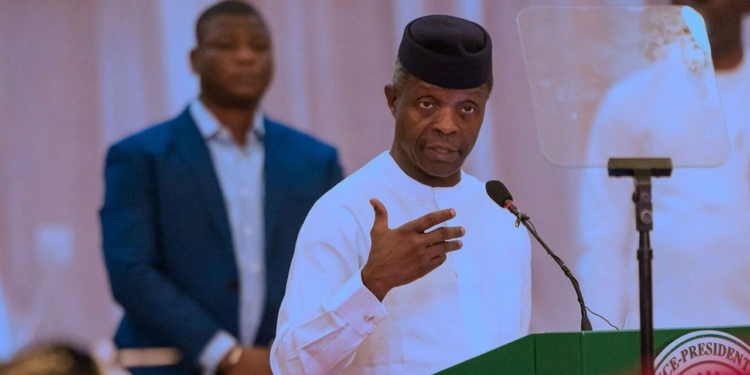Nigeria’s vice-president, Yemi Osinbajo has stated that 1.35 million women have benefitted from various enttepreneurial programmes of the federal government since 2015.
The figure represents 56.4 percent out of 2.4 million beneficiaries for all entrepreneurial and empowerment programmes.
According to the News Agency of Nigeria (NAN), Osinbajo said this on Tuesday in Abuja at the national dialogue forum on the girl-child in Nigeria.
He said the programmes focus on women because young girls need strong female role models to inspire them and help them to dream big.
The forum, themed; ‘Towards A Girl-Friendly Nigeria,’ was organised by the African Child Policy Forum (ACPF), the AfricaWide Movement for Children (AMC), and Women Arise for Change Initiative.
The VP said the government was working with stakeholders to implement programmes that would empower, educate and protect the girl-child from all forms of abuse.
“From 2015, we have ensured that all government social and entrepreneurial programmes have an affirmative component for women,” Osinbajo said.
“The reason why we have done this is because we very strongly believe that young girls need strong role models of successful women at all levels of society.
“Of the 2.4 million beneficiaries of government entrepreneurial and empowerment programmes, 56.4 percent were women.
“A total of N38 billion in loans have been disbursed in the last four years. Of the 1.1 million beneficiaries of our conditional cash transfer programmes, 1.078 million of them; that is, 98 percent are women.
“In addition, in our youth empowerment programme where we have engaged 526,000 young people, and just recently, the president had asked that it be increased to a million young people.
“Of the 526,000 we have employed, 40.4 percent of them are female. And, of the 106,074 cooks in our homegrown school feeding programme, 97 percent of them are female.
“So far, what we have tried to do is to ensure that affirmatively, we dedicate a certain percentage to women in our social and entrepreneurial programmes.”
He added that out of the 307,103 employees that have benefited so far from that payroll support programme, 43 percent of the beneficiaries are females.
Osinbajo, however, said that despite these efforts towards women, the government still had a long way to go.
He said that discriminatory social, cultural and, in many cases, organisational practices and attitudes were still hindering women.
He called on state governments and LGAs to collaborate with the federal government in keeping girls safe and ensuring they are given a fair chance.
“It is important to emphasise that the states and local governments have even more important responsibilities,” Osinbajo said.
“We run a federal system and questions of education, questions of medical care are essentially state matters.
“Primary and secondary schools are in the states and local governments; the federal government has just 100 schools of the thousands of schools there.
In her remarks, Pauline Tallen, minister of women affairs, said there was a need to address the gaps in existing legal and policy frameworks and allocate adequate resources for the protection of girls.
“We need to continue engaging in multi-sectoral collaboration between ministries to ensure progressive realisation and immediate protection of girls – creating a safe Nigeria for all girls where they meaningfully participate in governance,” Tallen explained.
“We also need to eliminate gender norms and cultural stereotypes that impede the efforts made to protect girls and to end all forms of violence against children, particularly abuse and sexual exploitation of girls.”





Discussion about this post